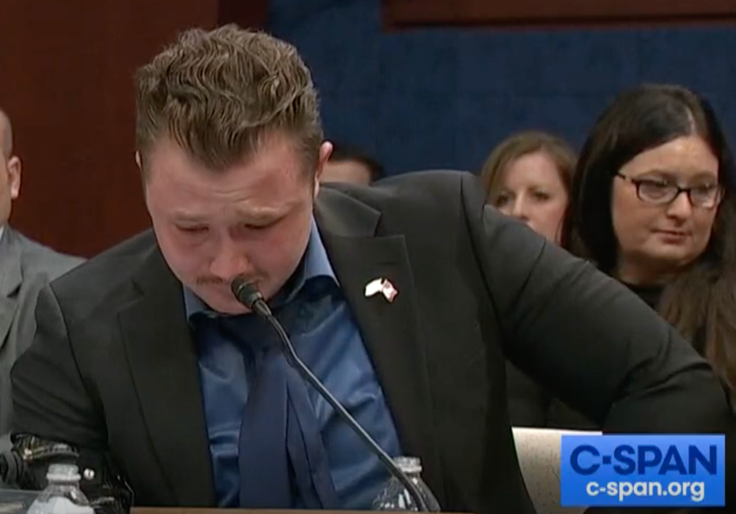U.S. military snipers stationed at the Afghanistan airport in 2021 prior to a deadly terror attack that killed 13 Americans had an opportunity to kill the suspected bomber but were not given authority from military leaders, according to one of the American service members on the ground that day.
Tyler Vargas-Andrews, a sergeant in the U.S. Marine Corps who was dispatched to Kabul during the Biden administration's bungled evacuation, on Wednesday told lawmakers on the House Foreign Affairs Committee that his sniper team was stopped from taking out the suspected terrorist bomber. Vargas-Andrews also recounted how the Biden State Department turned Afghans away from the airport, "condemning them to death" at the Taliban's hands. The Aug. 26 bombing left 13 U.S. military members dead and Vargas-Andrews severely wounded.
Vargas-Andrews's sniper team was provided with detailed information about the suspected bomber, including what he looked like. "I asked the intel guys why he wasn't apprehended sooner since we had a full description," the military veteran testified before the Foreign Affairs Committee during its first public hearing on the bungled withdrawal operation. "I was told the asset could not be compromised."
Soon after, Vargas-Andrews and his team spotted the bomber but were told to stand down by a commander in charge. "We reassured him of the ease of fire on the suicide bomber," Vargas-Andrews said. "Pointedly, we asked him for engagement authority and permission. We asked him if we could shoot. Our battalion commander said, and I quote, 'I don't know.'"
"Plain and simple, we were ignored," Vargas-Andrews testified. "Our expertise was disregarded. No one was held accountable for our safety."
Soon after that exchange, the suicide bomber attacked. Vargas-Andrews recounted "a massive wave of pressure. I'm thrown 12 feet onto the ground, but instantly knew what had happened. I opened my eyes to Marines dead or unconscious lying around me." Vargas-Andrews lost multiple organs and two of his limbs. He has had 44 surgeries to date as a result of the attack.
Following the explosion, Vargas-Andrews said that "no one wanted my report post-blast. Even [the Naval Criminal Investigative Service] and the FBI failed to interview me." The withdrawal, he said, "was a catastrophe and there was an inexcusable lack of accountability and negligence."
Vargas-Andrews laid a large portion of the blame on the Biden State Department, which he said turned away scores of Afghans seeking refuge from the Taliban.
"Some Afghans turned away from [Hamid Karzai International Airport] tried to kill themselves on the razor wire in front of us that we used as a deterrent," the veteran said. "They thought this was merciful compared to the Taliban torture that they faced."
The State Department would not process those seeking to board American evacuation planes during the evening, according to Vargas-Andrews, creating a backlog. The State Department pulled Marines from their security posts to help remove Afghans whom the department was unable to process, Vargas-Andrews said, accusing the administration of "condemning [these Afghans] to death."
Under questioning from committee chairman Michael McCaul (R., Calif.), Vargas-Andrew said, "both myself and team leader asked for engagement authority and [the commander] responded [by saying] he does not have that authority."
"As a result we have 13 dead service men, woman, 170 afghans killed, and 35 including yourself injured because that threat could not be taken out because your commanding officer could not give you the order," McCaul said.
Retired Lt. Col. David Scott Mann, who also helped coordinate civilian-led evacuation efforts after the Biden administration stopped chartering flights for those still trapped in the country, said the suicide bombing reignited mental health issues for scores of American veterans who fought in the Afghanistan war.
Mann described a "mental health tsunami" in the year after the bungled evacuation, saying that "73 percent of our Afghan war veterans say they feel betrayed by how this war eneded." Calls to veterans hotlines spiked 81 percent in the year after the withdrawal.
"My friend Brad was found dead a few months ago in a Mississippi hotel room," Mann said. "His wife, Dana, confirmed to me that the Afghan abandonment reactivated all the old demons he managed to put behind him from our time in Afghanistan together, and he just couldn’t find his way out of the darkness of that moral injury."
"We might be done with Afghanistan but it’s not done with us," Mann warned. "The enemy has a vote."
He said the administration's failure to implement a follow-up plan after removing U.S. troops resulted in the country becoming a safe haven for dozens of violent extremist groups.
"This colossal foreign policy failure," Mann said, "will follow us home and ultimately draw us right back into the graveyard of empires where this all started."
